2017小学英语语法知识点及习题
2017小升初英语语法强调句结构知识点.doc
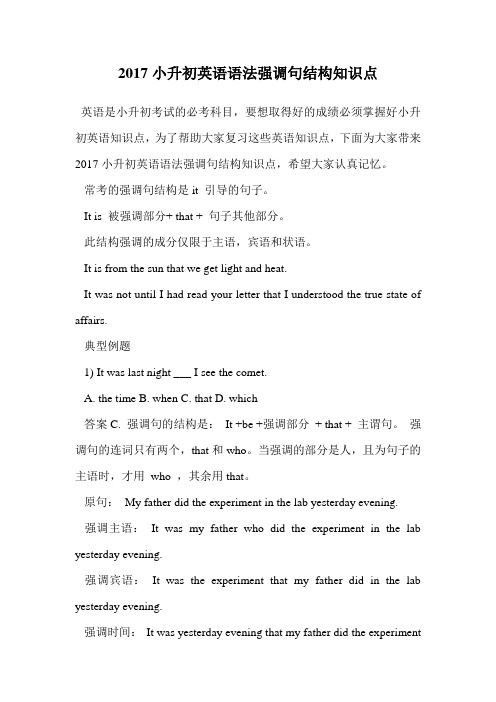
2017小升初英语语法强调句结构知识点英语是小升初考试的必考科目,要想取得好的成绩必须掌握好小升初英语知识点,为了帮助大家复习这些英语知识点,下面为大家带来2017小升初英语语法强调句结构知识点,希望大家认真记忆。
常考的强调句结构是it 引导的句子。
It is 被强调部分+ that + 句子其他部分。
此结构强调的成分仅限于主语,宾语和状语。
It is from the sun that we get light and heat.It was not until I had read your letter that I understood the true state of affairs.典型例题1) It was last night ___ I see the comet.A. the timeB. whenC. thatD. which答案C. 强调句的结构是:It +be +强调部分+ that + 主谓句。
强调句的连词只有两个,that和who。
当强调的部分是人,且为句子的主语时,才用who ,其余用that。
原句:My father did the experiment in the lab yesterday evening.强调主语:It was my father who did the experiment in the lab yesterday evening.强调宾语:It was the experiment that my father did in the lab yesterday evening.强调时间:It was yesterday evening that my father did the experimentin the lab.强调地点:It was in the lab that my father did the experiment yesterday evening.2)It is ten years ___ Miss Green returned to Canada.A. thatB. whenC. sinceD. as答案C. 考点是连词用法。
2017小升初英语语法强调句知识点:提高练习及详解

⼩升初英语语法强调句知识点:提⾼练习及详解 1. It _____ Mike and Mary who helped the old man several days ago.A. wasB. areC. wereD. had been 2. It was not until 1920 _____ regular radio broadcasts began.A. whichB. whenC. thatD. since 3. She said she would go and she ________ go.A. didn’tB. didC. reallyD. would 4. It was the training _____ he had as a young man _____ made him such a good engineer.A. what; thatB. that; whatC. that; whichD. which; that 5. — Were all three people in the car injured in the accident? — No, ______ only the two passengers who got hurt.A. there wereB. it wereC. there wasD. it was 6. It was not until 1936___baseball became a regular part of Olympic Games.A. thenB. whichC. thatD. when 7. ___in 1943___the harmful smog made its appearance in Los Angeles.A. Only… thatB. It was… thenC. That it was… whenD. It was… that 8. It was on the National Day___ she met with her separated sister.A. thatB. whereC. whenD. which 9. ___the 1500‘s___the first European explored the coast of California.A. It was until……thenB. It was not until … whenC. It is until……thatD. It was not until……that 10. ___in this room that our first meeting was held.A. Just whenB. WhenC. WhereD. It was 11. It was last night ___ I see the comet.A. the timeB. whenC. thatD. which 12. It was only with the help of the local guide ___________. A. was the mountain climber rescued B. that the mountain climber was rescued C. when the mountain climber was rescued D. then the mountain climber was rescued 13. The Foreign Minister said, “_______ our hope that the two sides will work towards peace.”A. This isB. There isC. That isD. It is 14.Was _____ that I saw last night at the concert?A. it youB. not youC. youD. that yourself 15.It was _____ he said _____ disappointed me.A. what, thatB. that, thatC. what, whatD. that, what 16.It was with great joy he received the news that his lost daughter had been found.A.becauseB.whichC.sinceD.that 17. It is ______ any wonder that his friend doesn’t like watching television much.A. noB. suchC. nearlyD. hardly 18.It was back home after the experiment. A.not until midnight did he go B.until midnight that he didn’t go C.not until midnight that he went D.until midnight when he didn’t go 19.Was it in 1969 _____ the American astronaut succeeded _____ landing on the moon?A. when, onB. that, onC. when, inD. that, in 20. It is these poisonous products _______ can cause the symptoms of the flu, such as headache and aching muscles.A. whoB. thatC. howD. what 21.It is the ability to do the job _______matters not where you come from or what you are.A. oneB. thatC. whatD. it 22. It was not until 1920 _____ regular radio broadcasts began.A. whileB. whichC. thatD. since 23. _____ is a fact that English is being accepted as an international language.A. ThereB. ThisC. ThatD. It 24. It was only with the help of the local guide ___________. A. was the mountain climber rescued B. that the mountain climber was rescued C. when the mountain climber was rescued D. then the mountain climber was rescued 25. Who was it _____ put so many large stones on the road?A. thisB. thatC. heD. she 26. What a silly mistake it is _____ you’ve made!A. itB. thisC. thatD. which 27. It was the boy _____ had been in prison _____ stole the money.A. who, whereB. that, howC. who, thatD. that, which 28. Why was _____ that the old woman was sent to prison?A. heB. itC. thatD. what 29. It was when she was about to go to bed _____ the telephone rang.A. sinceB. asC. thatD. then 30. It may have been at Christmas _____ John gave Mary a handbag.A. beforeB. whoC. thatD. when【答案及解析】 1. A。
2017小升初英语语法定语从句知识点:关系代词和关系副词
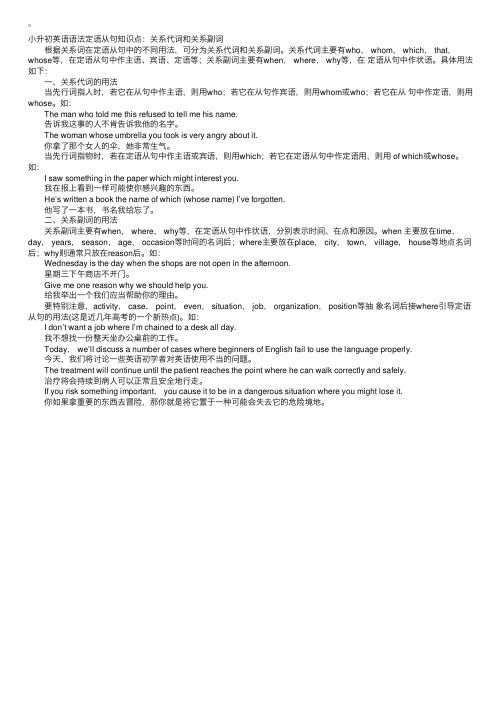
⼩升初英语语法定语从句知识点:关系代词和关系副词 根据关系词在定语从句中的不同⽤法,可分为关系代词和关系副词。
关系代词主要有who, whom, which, that,whose等,在定语从句中作主语、宾语、定语等;关系副词主要有when, where, why等,在定语从句中作状语。
具体⽤法如下: ⼀、关系代词的⽤法 当先⾏词指⼈时,若它在从句中作主语,则⽤who;若它在从句作宾语,则⽤whom或who;若它在从句中作定语,则⽤whose。
如: The man who told me this refused to tell me his name. 告诉我这事的⼈不肯告诉我他的名字。
The woman whose umbrella you took is very angry about it. 你拿了那个⼥⼈的伞,她⾮常⽣⽓。
当先⾏词指物时,若在定语从句中作主语或宾语,则⽤which;若它在定语从句中作定语⽤,则⽤ of which或whose。
如: I saw something in the paper which might interest you. 我在报上看到⼀样可能使你感兴趣的东西。
He’s written a book the name of which (whose name) I’ve forgotten. 他写了⼀本书,书名我给忘了。
⼆、关系副词的⽤法 关系副词主要有when, where, why等,在定语从句中作状语,分别表⽰时间、在点和原因。
when 主要放在time,day, years, season, age, occasion等时间的名词后;where主要放在place, city, town, village, house等地点名词后;why则通常只放在reason后。
如: Wednesday is the day when the shops are not open in the afternoon. 星期三下午商店不开门。
2017小学英语语法知识点及习题

2017 小学英语语法知识点及习题整理前言:学习和记忆法全身心记忆法根据测试,参与记忆单词的器官和身体部位越多,单词在大脑中的印象就越深刻,记忆的时间也就越长。
边读边写边记,除读记所使用的发音器官和身体的其它部位外,大脑中枢还要指挥大臂带动小臂,小臂带动手掌,手掌带动手指,从而正确地书写单词。
这种方法避免了"小和尚念经",因为只要注意力不集中,书写马上就出错。
书写既是大脑中枢的执行行为,又是大脑中枢的监察器。
联系记忆法联系记忆法就是在记忆单词的过程中,不去孤立地记一个词或词组,而是把它与同义词、反义词、相关词、句、篇等联系起来记忆。
同义记忆与近义记忆掌握一个词或词组的同义词和近义词或者其解释是掌握该语言重要的一环。
只有这样,才能初步做到用英语进行思维,而用英语思维是掌握英语的一个标志。
同类记忆与比较记忆同类记忆的涵盖面很广,如词性同类、动物同类、植物同类、事情同类、物品同类等。
如我们可以把边际从属连词放在一起记忆。
比较记忆是把词形相近或意义相近的词放在一起对比记忆。
这样记忆可以辨别词义,准确使用词汇。
联想记忆"联想是钓钩,在茫茫的艺海中,它能准确地钩住你所识记的事物。
"联想越丰富,越多彩,记忆的艺术也就越高超。
记忆以联想为基础;联想又是记忆的一种方法。
联想又分为类似联想、类别联想和词、句、篇联想。
无意识记忆法无意识记忆并不是无注意力记忆,而是时间分散记忆。
这种方法特别适合于工作忙碌的人。
首先准备一个袖珍笔记本,将要记忆的单词写在笔记本上。
只要有时间就拿出来读读。
这些单词见多了对你就会产生感情,你一定能记住,因为每读记一遍,就在你的大脑中加深一层印象。
这样记忆的单词可长久不忘,并能随时想起,是一种很好的长时记忆法。
构词记忆法利用英语词汇的构词规律,内在结构记忆单词是一种理性地使自己词汇量膨胀起来的方法。
英语单词是由词素构成的,词素分为自由词素和粘附词素。
记忆单词主要是记自由词素,因为有些自由词素可以充当词根,词根加词缀构成许多派生词。
2017小升初英语语法知识点-单数句变复数句.doc
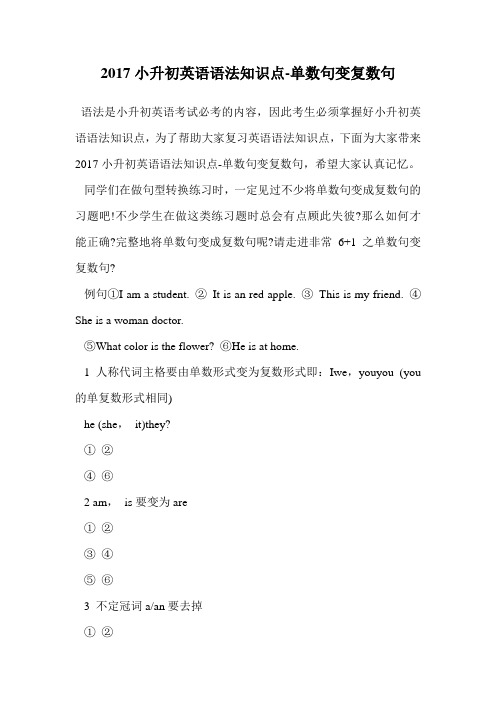
2017小升初英语语法知识点-单数句变复数句语法是小升初英语考试必考的内容,因此考生必须掌握好小升初英语语法知识点,为了帮助大家复习英语语法知识点,下面为大家带来2017小升初英语语法知识点-单数句变复数句,希望大家认真记忆。
同学们在做句型转换练习时,一定见过不少将单数句变成复数句的习题吧!不少学生在做这类练习题时总会有点顾此失彼?那么如何才能正确?完整地将单数句变成复数句呢?请走进非常6+1之单数句变复数句?例句①I am a student. ②It is an red apple. ③This is my friend. ④She is a woman doctor.⑤What color is the flower? ⑥He is at home.1 人称代词主格要由单数形式变为复数形式即:Iwe,youyou (you 的单复数形式相同)he (she,it)they?①②④⑥2 am,is要变为are①②③④⑤⑥3 不定冠词a/an要去掉①②③4 指示代词this和that要分别变为these或those①5 可数名词单数要变为其相应的复数形式①②③④⑤⑥6 man或woman作定语修饰可数名词时,在整个句子变成复数句的情况下,也要变为复数形式men?women.单数句变复数句时,句中的形容词?定冠词?副词?疑问词?介词短语和感叹词等都保持不变.②④⑤⑥一句话语法:单数句子变复数,变化规则要记住。
名词代词要变化,am,is要变are。
this,that变成啥,these,those来替它。
he,she,it要变啥,全部变they不用怕。
人称名词复数变,记清不规则变化名前冠词去掉它,其余成分原样加。
单数句:--Whats this? --Its a pen复数句--What . .单数句:--Whats that? --Its an English book.--What .2017小升初英语语法知识点-单数句变复数句是教育为大家带来的,希望大家在备考小升初英语的时候能够重视语法知识点,这样考试的时候就能轻松应对英语语法题。
(完整版)小学英语语法及练习题
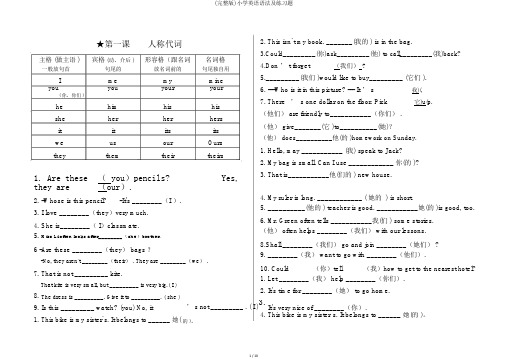
★第一课人称代词主格 (做主语 )宾格 (动、介后 )形容格(跟名词名词格一般放句首句尾的放名词前的句尾独自用I me my mine youyouyouryour ( 你,你们 )he him his his she her her hers it it its its weus our Ours theythemtheirtheirs1. Are these ( you )pencils? Yes,they are (our ).2. This isn`t my book. _______(我的 ) is in the bag.3.Could_________(你)ask_________(他) to call_________(我)back?4.Don ’ t forget (我们) ?5._________(我们 )would like to buy_________ (它们 ).6. ---Who is it in this picture? --- It ’ s 我)(.7. There ’ s one dollar on the floor. Pick它)u(p.(他们) are friendly to___________(你们) .(他) give_______(它 )to__________(她)?(他) does__________他(的 )homework on Sunday.1. Hello, may ___________ (我) speak to Jack?2. My bag is small. Can I use ____________ 你(的 )?3. That is___________他(们的 ) new house.2. -Whose is this pencil?-It's ________(I ).4. My ruler is long. ____________ ( 她的 ) is short.5. __________(他的 ) teacher is good. ___________她(的 )is good, too. 3. I love ________(they )very much.6. Mr. Green often tells ___________我(们 ) some stories. 4. She is________( I )classmate. (他) often helps ________(我们) with our lessons.5.Miss Li often looks after________(she )brother.6 -Are these ________(they ) bags ?8.Shall ________(我们) go and join ________(她们) ? 9. ________(我) want to go with ________(他们).-No, they aren't ________(their ) . They are ________(we ) .7. That is not _________ kite.10. Could(你)tell (我)how to get to the nearest hotel? 1. Let ________(我) help ________(你们). That kite is very small, but _________ is very big.( I )It's time for ________(她) to go home.8.2. The dress is _________. Give it to _________. ( she )9. Is this _________ watch? (you) No, it’ s not _________ . ( I )3.It's very nice of ________(你).1. This bike is my sister`s. It belongs to ______ 她( 4. This bike is my sister`s. It belongs to ______ 她(的 )。
2017年9月小学五年级英语语法重点知识归纳精简版
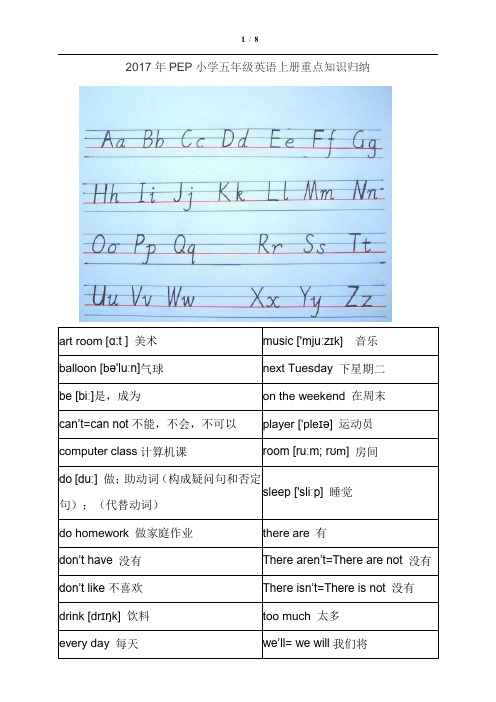
2017年PEP小学五年级英语上册重点知识归纳art room [ɑ:t ] 美术music ['mjuːzɪk] 音乐balloon [bə'luːn]气球next Tuesday 下星期二be [biː]是,成为on the weekend 在周末can’t=can not不能,不会,不可以player ['pleɪə] 运动员computer class计算机课room [ruːm; rʊm] 房间do [duː] 做;助动词(构成疑问句和否定sleep ['sliːp] 睡觉句);(代替动词)do homework 做家庭作业there are 有don’t have 没有There aren’t=There are not 没有don’t like不喜欢There isn’t=There is not 没有drink [drɪŋk] 饮料too much 太多every day 每天we’ll= we will我们将2、on+星期。
如on Monday, on Sunday . 表示在几点几分,用at. 如at 6:30。
3、with和…一起,with后面常用人称代词的宾格形式。
如:I can play ping-pong with you.我可以和你一起打乒乓球I can play ping-pong with him. I can play ping-pong with her .(him他、her她)。
4、I like Sundays.是指所有的星期日,所以用复数形式。
3.疑问词:what,where ,who,what time,who whose when how how many1)what 什么,What’s this?这是什么?What’s your name? 你的名字是什么?What’s your father like? 你爸爸长得什么样子?What’s your mother? 你妈妈是干什么的?2)where 哪里,如:Where is your ruler? 尺子在哪里呢?3)who 谁。
2017 最实用最全的-小学英语语法[优质ppt]
![2017 最实用最全的-小学英语语法[优质ppt]](https://img.taocdn.com/s3/m/a7eb22b36529647d2628521f.png)
’s结构也可以用于 “of”结构之后,如:a friend of my father’s , 出现这种情况是因为在一个名词前通常只用一 个限定词,又如:this son of mine, a friend of yours, a cousin of hers等等。 Isn’t Frank a friend of yours? That silly uncle of Tom’s has told me the same Joke five times.
第一人称
二、人称代词
第he it
they
宾格:
me us
you he后r 跟名h词im it
them
形容词性 物主代词: my our your her his its their
名词性 物主代词: mine ours yours hers his its theirs
不定冠词a,an
只能用于单数可数名词之前
冠
词
单数可数名词
定冠词the
复数可数名词
books, cups, cats dogs, birds, arms days, players
以-s,-sh, -ch, -x, +es
[iz]
-z结尾的名词
大多数以-o结 +es
[z]
尾的名词
以元音字母加o +s
[z]
结尾的名词
bus, brush, boxes, watch,
tomatoes, potatoes
2. zoo _zo_o_s______
3. glass _g_l_as_s_e_s___
- 1、下载文档前请自行甄别文档内容的完整性,平台不提供额外的编辑、内容补充、找答案等附加服务。
- 2、"仅部分预览"的文档,不可在线预览部分如存在完整性等问题,可反馈申请退款(可完整预览的文档不适用该条件!)。
- 3、如文档侵犯您的权益,请联系客服反馈,我们会尽快为您处理(人工客服工作时间:9:00-18:30)。
2017 小学英语语法知识点及习题整理前言:学习和记忆法全身心记忆法根据测试,参与记忆单词的器官和身体部位越多,单词在大脑中的印象就越深刻,记忆的时间也就越长。
边读边写边记,除读记所使用的发音器官和身体的其它部位外,大脑中枢还要指挥大臂带动小臂,小臂带动手掌,手掌带动手指,从而正确地书写单词。
这种方法避免了"小和尚念经",因为只要注意力不集中,书写马上就出错。
书写既是大脑中枢的执行行为,又是大脑中枢的监察器。
联系记忆法联系记忆法就是在记忆单词的过程中,不去孤立地记一个词或词组,而是把它与同义词、反义词、相关词、句、篇等联系起来记忆。
同义记忆与近义记忆掌握一个词或词组的同义词和近义词或者其解释是掌握该语言重要的一环。
只有这样,才能初步做到用英语进行思维,而用英语思维是掌握英语的一个标志。
同类记忆与比较记忆同类记忆的涵盖面很广,如词性同类、动物同类、植物同类、事情同类、物品同类等。
如我们可以把边际从属连词放在一起记忆。
比较记忆是把词形相近或意义相近的词放在一起对比记忆。
这样记忆可以辨别词义,准确使用词汇。
联想记忆"联想是钓钩,在茫茫的艺海中,它能准确地钩住你所识记的事物。
"联想越丰富,越多彩,记忆的艺术也就越高超。
记忆以联想为基础;联想又是记忆的一种方法。
联想又分为类似联想、类别联想和词、句、篇联想。
无意识记忆法无意识记忆并不是无注意力记忆,而是时间分散记忆。
这种方法特别适合于工作忙碌的人。
首先准备一个袖珍笔记本,将要记忆的单词写在笔记本上。
只要有时间就拿出来读读。
这些单词见多了对你就会产生感情,你一定能记住,因为每读记一遍,就在你的大脑中加深一层印象。
这样记忆的单词可长久不忘,并能随时想起,是一种很好的长时记忆法。
构词记忆法利用英语词汇的构词规律,内在结构记忆单词是一种理性地使自己词汇量膨胀起来的方法。
英语单词是由词素构成的,词素分为自由词素和粘附词素。
记忆单词主要是记自由词素,因为有些自由词素可以充当词根,词根加词缀构成许多派生词。
构词法主要有三种:转化、合成和派生。
语法规则整理一、名词复数规则1.一般情况下,直接加-s,如:book-books, bag-bags, cat-cats, bed-beds2.以s. x. sh. ch结尾,加-es,如:bus-buses, box-boxes, brush-brushes, watch-watches3.以“辅音字母+y”结尾,变y为i, 再加-es,如:family-families, strawberry-strawberries4.以“f或fe”结尾,变f或fe为v, 再加-es,如:knife-knives 5.不规则名词复数:man-men, woman-women, policeman-policemen,policewoman-policewomen, mouse-micechild-childrenfoot-feet,.tooth-teethfish-fish, people-people, Chinese-Chinese, Japanese-Japanese写出下列各词的复数I _________him _________this ___________her ______watch _______child _______photo ________diary ______day________ foot________ book_______ dress ________tooth_______ sheep ______box_______ strawberry _____thief _______yo-yo ______ peach______ sandwich ______man______ woman_______ paper_______ juice___________ water________ milk________ rice__________ tea__________二、一般现在时一般现在时基本用法介绍【No. 1】一般现在时的功能1.表示事物或人物的特征、状态。
如:The sky is blue.天空是蓝色的。
2.表示经常性或习惯性的动作。
如:I get up at six every day.我每天六点起床。
3.表示客观现实。
如:The earth goes around the sun.地球绕着太阳转。
一般现在时的构成1. be动词:主语+be(am,is,are)+其它。
如:I am a boy.我是一个男孩。
2.行为动词:主语+行为动词(+其它)。
如:We study English.我们学习英语。
当主语为第三人称单数(he, she,it)时,要在动词后加"-s"或"-es"。
如:Mary likes Chinese.玛丽喜欢汉语。
一般现在时的变化1. be动词的变化。
否定句:主语+ be + not +其它。
如:He is not a worker.他不是工人。
一般疑问句:Be +主语+其它。
如:-Are you a student?-Yes. I am. / No, I'm not.特殊疑问句:疑问词+一般疑问句。
如:Where is my bike?2.行为动词的变化。
否定句:主语+ don't( doesn't ) +动词原形(+其它)。
如:I don't like bread.当主语为第三人称单数时,要用doesn't构成否定句。
如:He doesn't often play.一般疑问句:Do( Does ) +主语+动词原形+其它。
如:- Do you often play football?- Yes, I do. / No, I don't.当主语为第三人称单数时,要用does构成一般疑问句。
如:- Does she go to work by bike?- Yes, she does. / No, she doesn't.特殊疑问句:疑问词+一般疑问句。
如:How does your father go to work?动词+s的变化规则1.一般情况下,直接加-s,如:cook-cooks, milk-milks2.以s. x. sh. ch. o结尾,加-es,如:guess-guesses, wash-washes, watch-watches, go-goes3.以“辅音字母+y”结尾,变y为i, 再加-es,如:study-studies一般现在时用法专练:一、写出下列动词的第三人称单数drink ________ go _______ stay ________ make ________look _________ have_______ pass_______ carry ____come________ watch______ plant_______ fly ________study_______ brush________ do_________ teach_______二、用括号内动词的适当形式填空。
1. He often ________(have) dinner at home.2. Daniel and Tommy _______(be) in Class One.3. We _______(not watch) TV on Monday.4. Nick _______(not go) to the zoo on Sunday.5. ______ they ________(like) the World Cup?6. What _______they often _______(do) on Saturdays?7. _______ your parents _______(read) newspapers every day?8. The girl _______(teach) us English on Sundays.9. She and I ________(take) a walk together every evening.10. There ________(be) some water in the bottle.11. Mike _______(like) cooking.12. They _______(have) the same hobby.13. My aunt _______(look) after her baby carefully.14. You always _______(do) your homework well.15. I _______(be) ill. I’m staying in bed.16. She _______(go) to school from Monday to Friday.17. Liu Tao _______(do) not like PE.18. The child often _______(watch) TV in the evening.19. Su Hai and Su Yang _______(have) eight lessons this term.20. -What day _______(be) it today?-It’s Saturday.三、按照要求改写句子1. Daniel watches TV every evening.(改为否定句)___________________________________________________2. I do my homework every day.(改为一般疑问句,作否定回答)________________________________________________________ 3. She likes milk.(改为一般疑问句,作肯定回答)___________________________4. Amy likes playing computer games.(改为一般疑问句,作否定回答) ___________________________________________________5. We go to school every morning.(改为否定句)_______________________________________________________ 6. He speaks English very well.(改为否定句)___________________________________________________7. I like taking photos in the park.(对划线部分提问)________________________________________________________ 8. John comes from Canada.(对划线部分提问)___________________________________________________9. She is always a good student.(改为一般疑问句,作否定回答)________________________________________________________ 10. Simon and Daniel like going skating.(改为否定句)___________________________________________________五、改错(划出错误的地方,将正确的写在横线上)1. Is your brother speak English? __________________2. Does he likes going fishing? __________________3. He likes play games after class. __________________4. Mr. Wu teachsus English. __________________5. She don’t do her homework on Sundays. _________________三、现在进行时1.现在进行时表示现在正在进行或发生的动作,也可表示当前一段时间内的活动或现阶段正在进行的动作。
